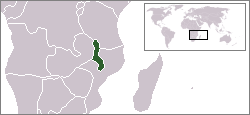 Image via Wikipedia
Image via Wikipedia- Submitted to the United Nations Human Rights Committee by the Centre for the Development of People (CEDEP) and the Centre for Human Rights and Rehabilitation (CHRR) and with the assistance of the International Gay and Lesbian Human Rights Commission (IGLHRC).
- For 25 October 2011 UN Human Rights Committee Meeting, Geneva.
The shocking events of the 20th and 21st of July 2011, when the Government of Malawi turned on its own people - harassing, beating and killing opposition demonstrators - clearly illustrates the climate of fear and rights abuse which currently exists within the State. There is an urgent need for meaningful action from the Human Rights Committee so that all people in Malawi can access and enjoy their most basic Covenant rights.
The current human rights situation in Malawi is extremely serious and possibly deteriorating. While Malawi is a signatory of the International Covenant for Civil and Political Rights ("the Covenant” or “the ICCPR") and has a relatively progressive constitution, egregious human rights violations are commonplace and the people of Malawi regularly experience discrimination, violence, and even death on numerous grounds, ranging from sex, sexual orientation, national origin, political belief, political expression, professional activity, prisoner status and/or HIV/AIDS status.
The most serious rights violator in Malawi is the President, Bingu wa Mutharika. His administration acknowledges, encourages and organises the intimidation and unlawful killing of individuals or groups which challenges the regime. He has incited his followers to take to the streets with arms, allowed the police to beat and kill members of the opposition, crushed media dissent, and broken up peaceful assemblies with deadly force. President Mutharika's regime ignores the authority of the national courts system, incites prejudice and hatred of vulnerable minorities and relegates women to the status of second class citizens.
The Parliament of Malawi, dominated by an overwhelming majority of the ruling Democratic Progressive Party (DPP), uses the country’s legislative system to legitimize and extend the current climate of violence and oppression. Recent legislative acts include allowing the police to search property without a warrant, allowing the Minister for Information to arbitrarily ban media publications and prohibiting two consenting females from engaging in consensual sexual intercourse.
Malawi is a country where violence and fear increasingly pervades all areas of society, where human rights defenders are beaten and even killed, where individuals who attempt to affect change are met with swift and brutal force. The fact that the Government of Malawi has chosen not to submit a report to the Committee demonstrates the value which the country’s administration place on upholding human rights. There is an urgent need for the Committee to take strong, appropriate action so that the people of Malawi can enjoy their full Covenant rights to which they are entitled.
LGBT human rights in Malawi








 Join our page
Join our page


0 comments:
Post a Comment